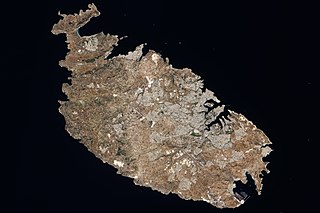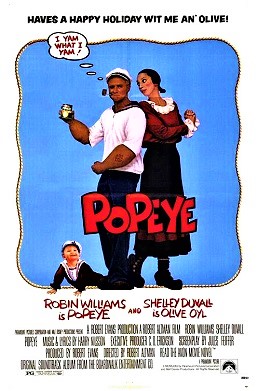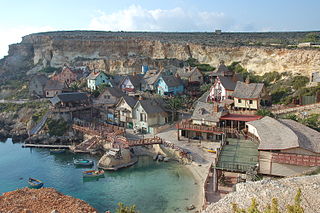
The economy of Malta is a highly industrialised service-based economy. It is classified as an advanced economy by the International Monetary Fund and is considered a high-income country by the World Bank and an innovation-driven economy by the World Economic Forum. It is a member of the European Union and of the eurozone, having formally adopted the euro on 1 January 2008.

Malta is an island in Southern Europe. It is the largest and most populous of the three major islands that constitute the Maltese Archipelago. The island is situated in the Mediterranean Sea, directly south of Italy and north of Libya. Lying to the south-east of the smaller islands of Gozo and Comino, it is sometimes referred to as Valletta for statistical purposes to distinguish the main island from the entire country. The island is 27 kilometres (17 mi) long and 14.5 kilometres (9 mi) wide, with a total area of 246 square kilometres (95 sq mi). The capital is Valletta, while the largest locality is Rabat. The island is made up of many small towns, which together form one larger urban zone with a population of 409,259. The landscape is characterised by low hills with terraced fields.
Hollywood North is a colloquialism used to describe film production industries and/or film locations north of its namesake, Hollywood, California. The term has been applied principally to the film industry in Canada, specifically to the cities Toronto and Vancouver.

Popeye is a 1980 American musical comedy film directed by Robert Altman and produced by Paramount Pictures and Walt Disney Productions. It is based on E. C. Segar's Popeye comics character. The script was written by Jules Feiffer, and stars Robin Williams as Popeye the Sailor Man and Shelley Duvall as Olive Oyl. Its story follows Popeye's adventures as he arrives in the town of Sweethaven.

A filming location is a place where some or all of a film or television series is produced, in addition to or instead of using sets constructed on a movie studio backlot or soundstage. In filmmaking, a location is any place where a film crew will be filming actors and recording their dialog. A location where dialog is not recorded may be considered a second unit photography site. Filmmakers often choose to shoot on location because they believe that greater realism can be achieved in a "real" place; however, location shooting is often motivated by the film's budget. Many films shoot interior scenes on a sound stage and exterior scenes on location.
The Irish film industry has grown somewhat in recent years thanks partly to the promotion of the sector by Fís Éireann/Screen Ireland and the introduction of heavy tax breaks. According to the Irish Audiovisual Content Production Sector Review carried out by the Irish Film Board and PricewaterhouseCoopers in 2008 this sector, has gone from 1,000 people employed six or seven years ago, to well over 6,000 people in that sector now and is valued at over €557.3 million and represents 0.3% of GDP. Most films are produced in English as Ireland is largely Anglophone, though some productions are made in Irish either wholly or partially.

Popeye Village, also known as Sweethaven Village, is a purpose-built film set village that has been converted into a small attraction fun park, consisting of a collection of rustic and ramshackle wooden buildings. It is located at Prajjet Bay/Anchor Bay, 3 km from the village core of Mellieħa, Malta.

A co-production is a joint venture between two or more different production companies for the purpose of film production, television production, video game development, and so on. In the case of an international co-production, production companies from different countries are working together.
Runaway production is a term used by the American Hollywood industry to describe filmmaking and television productions that are intended for initial release/exhibition or television broadcast in the U.S., but are actually filmed outside of the immediate Los Angeles area, whether in another country, another U.S. state, or in another part of California.

Films have been made in Lithuania since the early twentieth century.
The film industry in Connecticut, which previously consisted of small production companies making commercials, industrial films and some television programs, began growing dramatically as a state tax credit went into effect in 2006, attracting numerous filmmakers to shoot on location in the state.
Film and TV financing in Australia refers to government assistance to TV and cinema in Australia. Over the past 30 years, government assistance has involved a mixture of government support, distributor/ broadcaster involvement and private investment. To a significant extent, government policies have shaped the form and scale of financing.

Tourism in Malta is an important sector of the country's economy, contributing to about 15 percent of the nation's gross domestic product (GDP). It is overseen by the Malta Tourism Authority, in turn falls under the responsibility of the Minister for Tourism, the Environment and Culture. Malta features a number of tourism attractions encompassing elements of the island's rich history and culture, as well as aquatic activities associated with the Mediterranean Sea. In addition, medical tourism has become popular in Malta in recent years, especially since government efforts to market the practice to medical tourists in the United Kingdom.

The Virginia Film Office is a part of the Virginia Tourism Corporation located in Richmond, Virginia. The Virginia Film Office brings jobs and revenue to the Commonwealth by marketing the state as a location for film, television, and commercial production and by supporting and fostering Virginia's in-state production industry.
The film industry in Georgia is the largest among the states of the United States for production of feature films by number of films produced, as of 2016. Atlanta is the center of the film industry in Georgia with Turner, Tyler Perry, and EUE/Screen Gems studios located there.
The KOFIC Location Incentive program, launched in 2011 by Korean Film Council (KOFIC), covers a part of the expenses of "foreign feature films, television series and documentaries" shot in South Korea. KOFIC grants up to 30% cash rebate on “foreign audio-visual works production expenditure incurred for goods and services in Korea”. The grant amount is subject to change depending on the numbers of days taken to shoot the film and the remaining grant program budget as of the date of application.

Simshar is a 2014 Maltese drama film directed by Rebecca Cremona. It was selected as the Maltese entry for the Best Foreign Language Film at the 87th Academy Awards, but was not nominated. It was the first time that Malta submitted a film for the Best Foreign Language Oscar. The film tells the story of the Simshar incident.
Olivewood is a marketing term used in efforts of Cyprus to brand as a movie production destination. The term is a portmanteau of "Olive" and "Hollywood".

The Malta Film Commission is a quasi-governmental, non-profit, public organization based in Malta. Their primary purpose is to attract film productions to come to Malta for the benefit of the maltese economy. Its offices are located at the Malta Film Studios in Kalkara. The first proposal for a film commission was lobbied by Malcolm Scerri-Ferrante in 1997. The commission was then created as a film liaison office in 1999. Over the 22 years it has been operating, numerous financing incentives have been presented in 2005, 2008 and in 2014. The current film commissioner is Johann Grech. The implementation of new strategy has led to a large growth in the industry, with over 50 productions filmed in Malta resulting in more than €200 million being injected into Malta's economy via these incentives. The Film Commission also provides support for smaller film services within the country. Recently, the commission have organized the first edition of the Malta Film Awards. They were held on the 29th January 2022.












